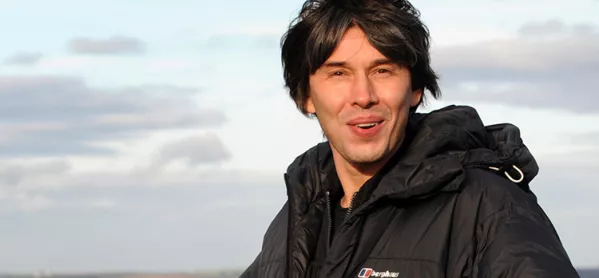Believe it or not, the head at my junior school was called Mr Perfect. He was brilliant. He ran after-school classes in maths and English and let kids stay on to play board games. When we played Risk, we would discuss each move and only make one or two moves a week, so one game would go on all term.
I grew up in Chadderton, outside Oldham, and we lived next door to the playing fields for my junior school, Chadderton Hall. Against the rules, I could climb over the fence to get there.
One thing I wasn’t happy about at junior school was that I wanted to have physics lessons, but you didn’t get specific science lessons until you were in senior school. My interest in physics and astronomy came from outside school - I suspect from growing up during the Apollo space programme. I was born in 1968 so definitely absorbed the sense of excitement - my father was into it too and I remember the pictures of the moon landings we had on the wall in our house.
I was probably seven or eight when I had my first telescope and I remember having star maps and looking up at the sky before that. For as long as I can remember, that’s what I wanted to do.
My favourite teacher was Mr Galloway, my first physics teacher at Hulme Grammar in Oldham. It was quite a traditional boys’ school and though he looked like a Seventies physicist, complete with beard, Mr Galloway was very young, relaxed and different from most of the other teachers. What was great was that you could sit down with him after school and say “I want to build this piece of electronics” and he would help you.
My keyboard playing mixed quite well with my interest in physics. When I was about 11 I wasn’t really interested in music - I was interested in bits of electronics and noises and synthesisers. I had a band with a friend, but we were keener on building a recording studio.
One of the bands we liked was Ultravox, and they had found a way to trigger chords on a keyboard to make it syncopate with a high-hat drum. We wanted to make the same noise and needed to build something called a “noise gate” that would be triggered by the high-hat. We asked Mr Galloway about it, and he sat down and drew a circuit. Then we built the circuit with him and it worked.
Years later I met Billy Currie, the keyboard player with Ultravox, and told him: “We had to build this thing with our physics teacher.” And he said: “I know, I did the same.” It was the only solution at the time for making that sound.
I enjoyed other teachers, but they were eccentrics in some ways. For chemistry we had quite a character. He was a perfectionist and you had to do everything very precisely. He used to go mental if anyone did anything wrong, and practical experiments could clash with his control-freakery. If anyone sprayed some copper sulphate out of a test tube he would scream and throw people out of the lesson. When you were 11 you would all be frightened to death of him. But by the time you were 15 everyone was fond of him because he was so strange. He would horrify educationalists today. But he got amazing results. His approach was quite modern because he taught you to pass the exam with precision.
Professor Brian Cox was talking to Michael Shaw.



